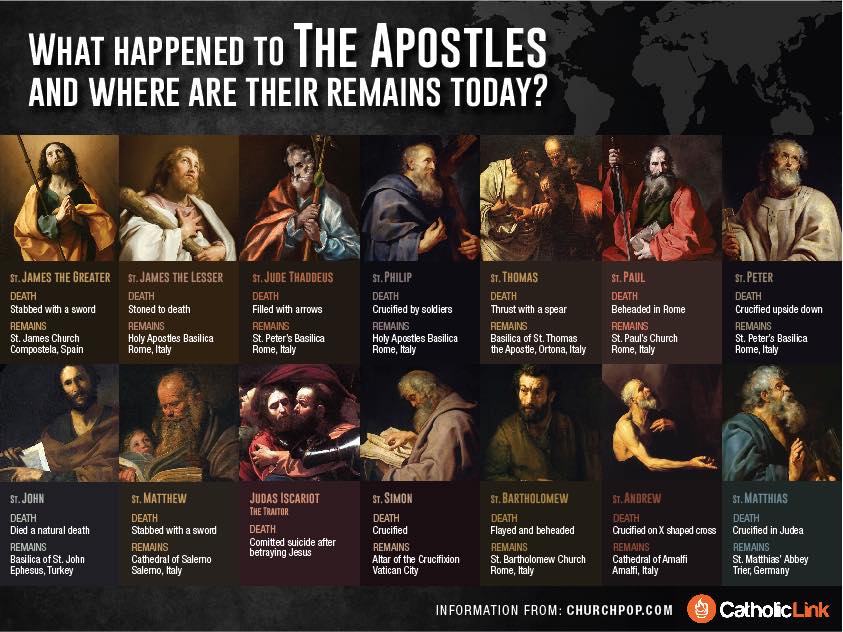|
Sometimes I wonder - as do many Catholics I suppose - as to what happened to the Apostolic College after the Ascension of the Lord, and the publishing of the Gospel. All of the Apostles, save St. John and Judas Iscariot, suffered martyrdom for the Lord, and St. John was almost martyred, when he was boiled alive before the Latin Gate in Rome, but was spared by the Lord since his ministry wasn't ended. He still had his Gospel, Epistles and Apocalypse to compose. Incidentally, St. John was the youngest of the Apostles, probably being in his late teens/early twenties when he was called.
Another interesting point is that, according to the private revelations of Blessed Anne Catherine Emmerich, six of the original twelve Apostles were related to Christ Himself, thus making their promotion to the Apostolic College and then later to the Priesthood and the Episcopacy, well.....nepotism. When you look at the images, remember that back in the day, these men weren't the halo-crowned saints we now have the honour of venerating, but were very human indeed: St. Peter, the Prince of the Apostles and Vicar of Jesus Christ, was often impulsive, saying the right thing only to say the wrong thing later, or just putting his foot in his mouth altogether, and later denied Christ. Christ restored him to the Primacy, after which St. Peter became the unconquerable Rock upon which the Church is built. His Successors, the Roman Pontiffs, will reign over the Church until the end of time. St. John and St. James the Greater were brother who would often bicker with each other - Christ called them the sons of thunder because of it - and even with the other Apostles, especially when they demanded to be at the side of Christ in the Kingdom, thus starting a Apostolic feud about who was going to sit where next to Christ. St. Thomas was the septic of the group, being the last to accept the Resurrection, hence why he is called Doubting Thomas, and why that phrase is used even to this day to describe someone who is an obstinate doubter. He later preached in India, where the Christians there still call themselves St. Thomas Christians, in his honour. St. Simon the Zealot is called this not because of his zealous love for Christ (though one could claim that in truth) but because he originally, before being called to the College, was part of a radical Jewish sect called the Zealots who, for want of a better phrase, believed in the use of terrorism in order to free Israel from Roman rule. Thanks be to God the Lord found another outlet for his zealotry: the Gospel. I think we are all familiar with Judas Iscariot, who betrayed Our Lord and then committed suicide for it. His falling from the faith happened way back in John 6, when Christ makes explicit the doctrine of the Holy Eucharist, namely, that it is His Flesh and Blood. Judas disbelieved this, and this was the cause of his later betrayal. He was also a thief, who stole money from Our Lord's own purse, of which he was in charge. For his crimes, Judas is the only one of the Apostles to not have reached Heaven. And lastly, though not of the original twelve, we have St. Paul. Here was a zealous Pharisee who actually murdered Christians, only to later become a Christian, and probably the most vocal of all the Apostles. The magnitude of his missionary journeys, and his predominate interest in converting the Gentiles later made him to become the Apostle to the Gentiles. His statue stands on my desk, right next to the laptop I am currently typing this on. For his faithfulness to the Church and to Christ the Holy Spirit willed that the New Testament be composed predominately of his Epistles, in which are contained diverse lofty mysteries. Together with St. Peter, his Co-Apostle, he is a mighty Pillar of the Roman Church, the Mother of all Churches and of all Christians in the world. |
Archives
April 2024
|

